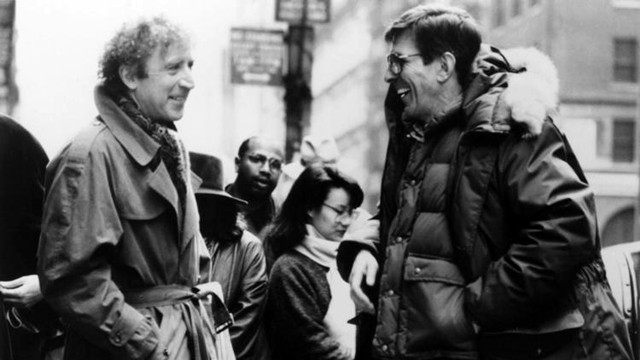
By Jae-Ha Kim
Chicago Sun-Times
September 21, 1990
(NEW YORK) Gene Wilder is sitting in a very demure-looking hotel room, sipping on an early-morning cup of coffee. Dressed in a pair of beige chinos, a blue polo shirt and a pair of well-worn Adidas, he ruffles his hand through his trademark mane of curly brown hair. Unlike his on-screen image, where he generally portrays wild and crazy characters, Wilder is genteel in person.
Best known for using slapstick humor in such films as “Blazing Saddles,” “Young Frankenstein” and “See No Evil, Hear No Evil,” Wilder is used to making it in films with his comedic timing. But with “Funny About Love,” a romantic comedy directed by Leonard Nimoy and co-starring Christine Lahti, Wilder is saying goodbye to slapstick, hello to diversity.
“Funny About Love” opens at local theaters today.
“I think 95 percent of people see me as a comedian,” Wilder said. “They kind of picture me as being a funny, off the wall, zany, Mel Brooksian, Richard Pryor wacko. I’ve got to give Leonard credit because he wanted me in this picture, and I couldn’t even figure out why when I first read the script.
“I thought, `Why’d they think of me?’ I wanted to play the role, because I wanted to be funny, but in a human comedy and not a two-dimensional cartoon character like (I did in) “Blazing Saddles” or “Young Frankenstein.” I loved those movies, but I didn’t want to do that again.”
Based on an article written by Chicago Tribune columnist Bob Greene, “Funny About Love” is a film about cartoonist Duffy Bergman (Wilder) and caterer Meg Lloyd (Lahti). They meet after Duffy tastes her horrible cappucino. Eventually they fall in love, marry and try to conceive a baby.
In a way, cappucino serves as a metaphor throughout the movie for all the good and bad elements of love, and it shows up at all the crucial points. With the importance placed on cappucino throughout the picture, this movie should do for it what “Twin Peaks” is doing for coffee.
“The film was a risk for both me and the producers,” Wilder said. “I didn’t know that people would accept me in this kind of role where, well, I’m not exactly the typical kind of romantic lead, but where I do end up with the girl at the end. Some people have asked me whether I would’ve been happier doing a straight-ahead drama with no comedic elements and I have to say no. Real life has both happiness and unhappiness in it.”
Born and reared in Milwaukee and educated at the University of Iowa, Wilder credits his Midwest upbringing for keeping him grounded. Today, he prefers to live in Stamford, Conn., rather than New York or Los Angeles, where he said he only goes to for work.
“Being from the Midwest gives me a wholly different perspective on life that I don’t think people from the West or East coasts have,” he said. “I never expected anything to come easily, which is a good thing because it never has. But I don’t regret that, either.”
While Wilder proves himself as a dramatic actor in the film, he shines during the movie’s funniest scenes. There’s one where Duffy and Meg are at the doctor’s, trying to figure out why they can’t have a baby. The snappy banter sounds ad-libbed, but Wilder said the scene, like many others, actually were worked out during a two-day session he had with Lahti, where the two taped their improvisational conversation with each other.
Then there’s another scene when Duffy is overpowered by his young and energetic lover, Daphne Delillo (played by Mary Stuart Masterson), who likes to pounce on him from a mini-trampoline. Working with Masterson was a treat, he said, but he did feel a little unnerved by their love scenes.
“It was like she came out of a crib – a very sexy crib, but a crib nonetheless,” Wilder said, referring to the very youthful-looking actress. “I made jokes about cradle robbing at first to kind of ease the tension. I think the whole thing about her looking so young actually made it easier to relate to the role better, because I took a very fatherly approach to her in the film. And in the movie, Duffy didn’t know whether he had a lover or a daughter.
“It’s funny about love. Not as in `ha ha,’ but as in peculiar. Men, when they’re in fear of losing their self-esteem, oftentimes find younger companions to make them feel younger sexually.”
For Wilder, who lost his wife, comedian Gilda Radner, to cancer a few years ago, making a film about relationships stirred up some strong emotions. But the gentle humor in the movie helped him get through it, he said.
“I don’t think I’d be as good in a movie with no humor in it as a lot of other actors out there. Humor is the river that takes me where I’m going.”
©JAE-HA KIM |All Rights Reserved